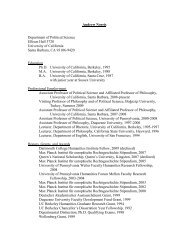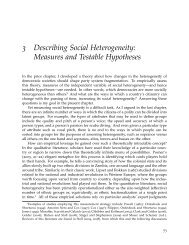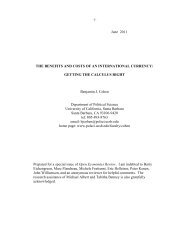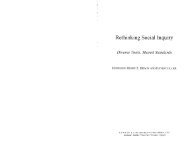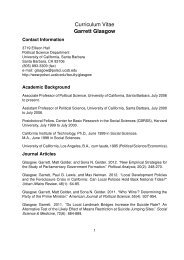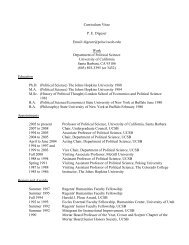-1- May 2012 THE YUAN'S LONG MARCH* Benjamin J. Cohen Can ...
-1- May 2012 THE YUAN'S LONG MARCH* Benjamin J. Cohen Can ...
-1- May 2012 THE YUAN'S LONG MARCH* Benjamin J. Cohen Can ...
Create successful ePaper yourself
Turn your PDF publications into a flip-book with our unique Google optimized e-Paper software.
-10-<br />
MEANS<br />
But what about Beijing’s choice of means – its statecraft? Have the authorities chosen the<br />
right tools and instruments to make their strategy succeed? Are the country’s power resources<br />
sufficient for the task at hand? Here we may be permitted a greater measure of doubt.<br />
Preferences and power<br />
Recall the challenge. Though China may aspire to global status for its currency, it cannot<br />
directly compel outsiders to use the yuan. There are no legal tender laws at the international<br />
level. As indicated, influence in this context must instead be exercised indirectly, through other<br />
pathways. One way or another, the RMB must be made to appeal to potential users. In short, it<br />
must be made competitive. The question is: Does Beijing have the power to successfully modify<br />
preferences on the demand side of the market?<br />
Historically, preferences on the demand side have tended to be shaped by three essential<br />
attributes, as I have explained elsewhere (<strong>Cohen</strong> 1998, 2004). First, at least during the initial<br />
stages of a currency’s cross-border use, is widespread confidence in the money’s future value and<br />
usability, backed by political stability in the country of origin. The issuer must have a proven<br />
track record of relatively low inflation and inflation variability. It must also have a good<br />
reputation for respect of property rights and the rule of law. Second are the qualities of “exchange<br />
convenience” and “capital certainty” – a high degree of transactional liquidity and reasonable<br />
predictability of asset value. The key to both is a set of well developed financial markets,<br />
unencumbered by high transactions costs or formal or informal barriers to entry. The markets<br />
must be broad, with a large assortment of instruments available for temporary or longer-term<br />
forms of investment. They must also be deep and resilient, with fully operating secondary<br />
markets for most if not all financial products. And third, the country must promise a broad<br />
transactional network to ensure an ample constituency for its currency, otherwise known as<br />
“network externalities.” This means an economy that is large in absolute size and well integrated<br />
into world markets. No money has ever been adopted widely for international use that was not<br />
initially backed by a leading national economy. To the extent that these three qualities have<br />
prevailed, a money’s appeal was enhanced, encouraging wide adoption.<br />
In China’s case, however, only one of the three attributes is manifestly in evidence – a<br />
broad transactional network. Economic size stands out as the RMB’s trump card: the principal<br />
power resource that Beijing brings to the international competition among currencies. The<br />
Chinese economy is already a giant among nations – the second largest in the world – and, if<br />
recent trends persist, could surpass the United States in as little as another decade. The country is<br />
also now the world’s leader in exports and second biggest market for imports, creating a<br />
considerable potential for network externalities. In monetary matters, by contrast, China remains<br />
something of a pygmy, with little direct power. As one observer writes: “China’s economic<br />
influence still derives primarily from its role in the international trading system, rather than its<br />
financial might” (Kelly 2009: 6). If demand-side currency preferences are to be successfully<br />
altered in present circumstances, it will have to be by exploiting the country’s growing weight in<br />
the global economy – what HSBC (2011) calls China’s “gravitational pull” – rather than by any


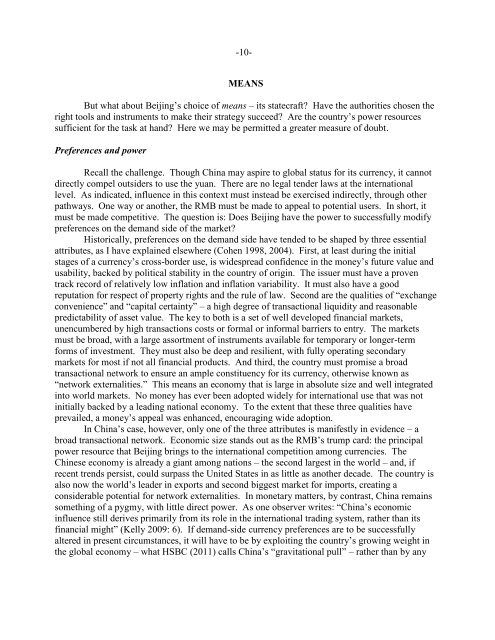
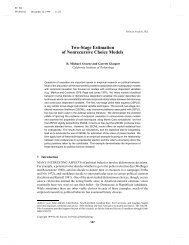
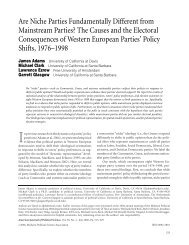
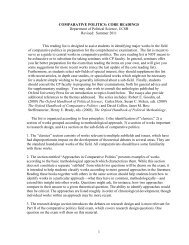
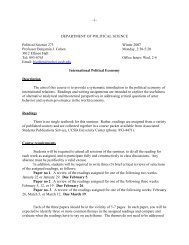
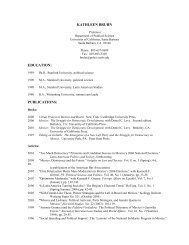
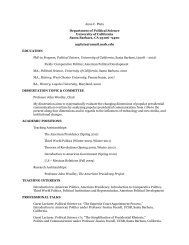
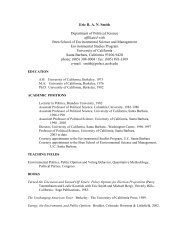
![Curriculum Vitae [abbreviated] John T. Woolley Professor of Political ...](https://img.yumpu.com/25423597/1/190x245/curriculum-vitae-abbreviated-john-t-woolley-professor-of-political-.jpg?quality=85)
